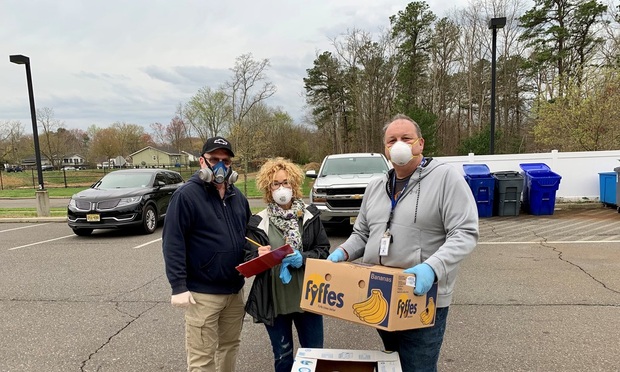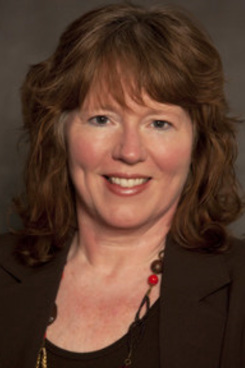After Hours: Cooper Levenson; Rutgers Law School
Cooper Levenson Announces Early Start to 'Let Us Eat – Please'; Rutgers Law Clinic Helps Families Facing Foreclosure
April 16, 2020 at 09:00 AM
4 minute read
Cooper Levenson Announces Early Start to 'Let Us Eat – Please'
 ATLANTIC CITY FIRM AIDS FOOD PANTRY: The ''Let Us Eat – Please, Inc.' program supported by Atlantic City law firm Cooper Levenson enabled the Community FoodBank to deliver boxes of food and vouchers at the Egg Harbor City Community School. Pictured, left to right, are Egg Harbor City Community School's Head of Buildings and Grounds Scott Wheeler, Guidance Counselor Tina Hennaut, and Principal Jack Griffith.
ATLANTIC CITY FIRM AIDS FOOD PANTRY: The ''Let Us Eat – Please, Inc.' program supported by Atlantic City law firm Cooper Levenson enabled the Community FoodBank to deliver boxes of food and vouchers at the Egg Harbor City Community School. Pictured, left to right, are Egg Harbor City Community School's Head of Buildings and Grounds Scott Wheeler, Guidance Counselor Tina Hennaut, and Principal Jack Griffith.Cooper Levenson announced an early start to the summer program led by "Let Us Eat – Please Inc.," a member charity of the Community Food Bank of New Jersey, Southern Branch. The charities have teamed up to deliver food to area school districts with families in need during the COVID-19 crisis. "The attorneys in our education law group learned that our client school districts have families in urgent need because of school closings during the COVID-19 pandemic," said Kenneth J. Calemmo Jr., chairman of the charity and chief operating officer of Cooper Levenson, in a statement. "We are very pleased to be able to work with our local school districts and provide them with emergency boxes of food and vouchers that will each feed a family of four for 14 days—enough for a total of 53,550 meals," he added. The "Let Us Eat – Please" program is set to enable the food bank to deliver a total of 1,275 boxes of food and vouchers to school districts in Galloway Township, Somers Point, Egg Harbor City, and Egg Harbor Township, the release said, noting that delivery was scheduled for April 8.
Rutgers Law Clinic Helps Families Facing Foreclosure
 Anne Mallgrave, the director of the Rutgers Law Mortgage Foreclosure Project in Camden.
Anne Mallgrave, the director of the Rutgers Law Mortgage Foreclosure Project in Camden.A Rutgers Law School professor from the Camden campus and her students are working to help residents avoid losing their homes to foreclosure. Approximately 95% of homeowners facing foreclosure do not have legal representation, according to Anne Mallgrave, director of the Rutgers Law Mortgage Foreclosure Project, in a recent statement. "They don't understand the terminology, they don't understand the law, they don't understand the process," Mallgrave said. "I've had conversations with homeowners over the past few years where they had a valid defense to the foreclosure action, but they were trying to represent themselves and didn't know how to make that argument, it just wasn't heard, and their homes have been foreclosed on." She added, "While they are going through the process, the foreclosure action continues to move on," and, "If the homeowners haven't filed an answer to the complaint, it moves on very quickly, and before they know it, in some cases, their home is listed for sheriff's sale as they are still trying to negotiate a modification." Under Mallgrave's guidance, Rutgers Law students participating in the project gain experience serving clients; they conduct legal research; interview clients; counsel clients about their options; and prepare documents and briefs that are filed in court. In New Jersey, third-year law students are permitted to be certified to practice law and are allowed to represent a client at a mediation hearing. The program, launched in 2017, is funded by a grant from the New Jersey State Bar Foundation. Eventually, Mallgrave said, she hopes to expand the program by developing a community education program in South Jersey to provide information to help homeowners understand and navigate the foreclosure process. "We're just trying to level the playing field from the get-go," she said.
This content has been archived. It is available through our partners, LexisNexis® and Bloomberg Law.
To view this content, please continue to their sites.
Not a Lexis Subscriber?
Subscribe Now
Not a Bloomberg Law Subscriber?
Subscribe Now
NOT FOR REPRINT
© 2025 ALM Global, LLC, All Rights Reserved. Request academic re-use from www.copyright.com. All other uses, submit a request to [email protected]. For more information visit Asset & Logo Licensing.
You Might Like
View All
Neighboring States Have Either Passed or Proposed Climate Superfund Laws—Is Pennsylvania Next?
7 minute read
An Overview of Proposed Changes to the Federal Rules of Procedure Relating to the Expansion of Remote Trial Testimony
15 minute readLaw Firms Mentioned
Trending Stories
- 1New York-Based Skadden Team Joins White & Case Group in Mexico City for Citigroup Demerger
- 2No Two Wildfires Alike: Lawyers Take Different Legal Strategies in California
- 3Poop-Themed Dog Toy OK as Parody, but Still Tarnished Jack Daniel’s Brand, Court Says
- 4Meet the New President of NY's Association of Trial Court Jurists
- 5Lawyers' Phones Are Ringing: What Should Employers Do If ICE Raids Their Business?
Who Got The Work
J. Brugh Lower of Gibbons has entered an appearance for industrial equipment supplier Devco Corporation in a pending trademark infringement lawsuit. The suit, accusing the defendant of selling knock-off Graco products, was filed Dec. 18 in New Jersey District Court by Rivkin Radler on behalf of Graco Inc. and Graco Minnesota. The case, assigned to U.S. District Judge Zahid N. Quraishi, is 3:24-cv-11294, Graco Inc. et al v. Devco Corporation.
Who Got The Work
Rebecca Maller-Stein and Kent A. Yalowitz of Arnold & Porter Kaye Scholer have entered their appearances for Hanaco Venture Capital and its executives, Lior Prosor and David Frankel, in a pending securities lawsuit. The action, filed on Dec. 24 in New York Southern District Court by Zell, Aron & Co. on behalf of Goldeneye Advisors, accuses the defendants of negligently and fraudulently managing the plaintiff's $1 million investment. The case, assigned to U.S. District Judge Vernon S. Broderick, is 1:24-cv-09918, Goldeneye Advisors, LLC v. Hanaco Venture Capital, Ltd. et al.
Who Got The Work
Attorneys from A&O Shearman has stepped in as defense counsel for Toronto-Dominion Bank and other defendants in a pending securities class action. The suit, filed Dec. 11 in New York Southern District Court by Bleichmar Fonti & Auld, accuses the defendants of concealing the bank's 'pervasive' deficiencies in regards to its compliance with the Bank Secrecy Act and the quality of its anti-money laundering controls. The case, assigned to U.S. District Judge Arun Subramanian, is 1:24-cv-09445, Gonzalez v. The Toronto-Dominion Bank et al.
Who Got The Work
Crown Castle International, a Pennsylvania company providing shared communications infrastructure, has turned to Luke D. Wolf of Gordon Rees Scully Mansukhani to fend off a pending breach-of-contract lawsuit. The court action, filed Nov. 25 in Michigan Eastern District Court by Hooper Hathaway PC on behalf of The Town Residences LLC, accuses Crown Castle of failing to transfer approximately $30,000 in utility payments from T-Mobile in breach of a roof-top lease and assignment agreement. The case, assigned to U.S. District Judge Susan K. Declercq, is 2:24-cv-13131, The Town Residences LLC v. T-Mobile US, Inc. et al.
Who Got The Work
Wilfred P. Coronato and Daniel M. Schwartz of McCarter & English have stepped in as defense counsel to Electrolux Home Products Inc. in a pending product liability lawsuit. The court action, filed Nov. 26 in New York Eastern District Court by Poulos Lopiccolo PC and Nagel Rice LLP on behalf of David Stern, alleges that the defendant's refrigerators’ drawers and shelving repeatedly break and fall apart within months after purchase. The case, assigned to U.S. District Judge Joan M. Azrack, is 2:24-cv-08204, Stern v. Electrolux Home Products, Inc.
Featured Firms
Law Offices of Gary Martin Hays & Associates, P.C.
(470) 294-1674
Law Offices of Mark E. Salomone
(857) 444-6468
Smith & Hassler
(713) 739-1250








